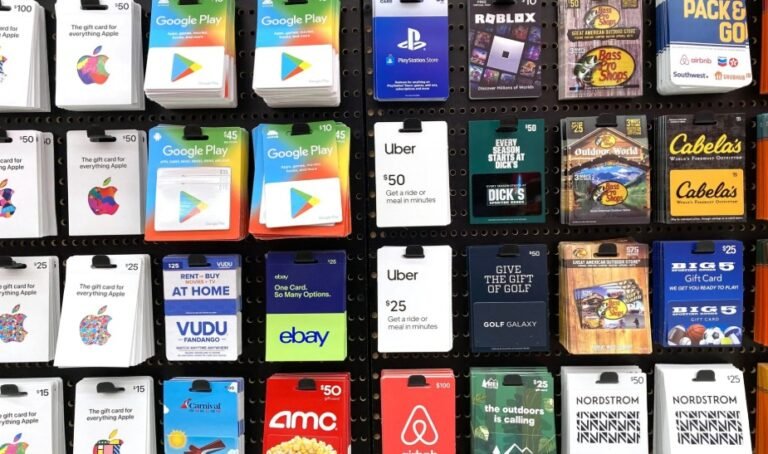Giving and receiving gifts is one of the most beautiful human traditions that transcends cultures, religions, and time. A gift is much more than just a physical item; it is a reflection of emotions, care, and thoughtfulness. giftcardmall/mygift Whether it’s a birthday surprise, a wedding present, or a simple “thank you” token, gifts play a vital role in building relationships and expressing love.
The Meaning Behind Gifts
A gift is not merely an object wrapped in colorful paper. It carries meaning — an unspoken message of affection, appreciation, or gratitude. When someone gives a gift, they are often expressing feelings that words alone cannot describe. A carefully chosen gift shows thoughtfulness and effort, while a random or impersonal one can feel empty.
In essence, the act of giving is about connection. It strengthens bonds between people — between friends, family members, colleagues, and even strangers. The emotional value of a gift often outweighs its material worth. For example, a handwritten letter or a handmade craft can be more meaningful than an expensive gadget because it reflects genuine effort and emotion.
The Psychology of Giving
Psychologists have long studied why humans feel joy when they give to others. Research shows that giving activates parts of the brain associated with pleasure and satisfaction. This “helper’s high” explains why acts of generosity often make the giver feel happier than the receiver.
Gift-giving also plays a role in social bonding. It helps people show empathy, build trust, and create emotional intimacy. In some cultures, gifts are essential in maintaining harmony and showing respect — for example, presenting gifts to hosts, elders, or business partners.
However, giving should always come from the heart, not obligation. A gift given only to impress or manipulate can lose its true meaning. Authentic gifts are those that reflect sincerity and understanding of the recipient’s needs or interests.
Choosing the Perfect Gift
Selecting the right gift can sometimes be challenging. The key lies in knowing the recipient. A thoughtful gift shows that you’ve paid attention to the person’s preferences, personality, and desires.
Here are a few tips to choose meaningful gifts:
- Listen and Observe: Notice what the person talks about, what they like, or what they might need. Sometimes people drop hints without realizing it.
- Personalization: Custom gifts like engraved jewelry, photo albums, or personalized mugs show extra care and effort.
- Experiences over Objects: Giving experiences, such as concert tickets, a spa day, or a trip, can create memories that last far longer than material items.
- Practicality: Useful gifts — something the person can use daily — often make the best presents.
- Handmade Touch: A DIY or handmade gift can feel deeply personal and heartfelt.
Ultimately, the best gift is one that reflects understanding and love. Even a small, inexpensive token can mean the world when it comes from the heart.
The Etiquette of Receiving Gifts
While much emphasis is placed on giving, receiving gifts graciously is equally important. Accepting a gift with genuine gratitude shows respect and appreciation for the giver’s effort.
Even if the gift is not exactly what you wanted, it is polite to smile and thank the giver sincerely. The act of giving represents goodwill, and a kind response reinforces that connection. It is also thoughtful to send a thank-you note or message afterward, acknowledging the gift and the sentiment behind it.
Gifts Across Cultures
Gift-giving traditions vary greatly around the world, reflecting unique cultural values and customs. For example:
- In Japan, the presentation of the gift — the wrapping and manner of giving — is as important as the gift itself.
- In India, gifts are often exchanged during festivals like Diwali, symbolizing prosperity and goodwill.
- In Western countries, gifts are common during holidays such as Christmas and birthdays, representing joy and togetherness.
- In China, red wrapping paper symbolizes luck and happiness, while certain gifts like clocks or sharp objects are avoided because they are associated with bad luck.
Understanding these cultural nuances is essential, especially in international relationships or business settings.
Modern Trends in Gifting
In today’s digital world, gifting has evolved beyond physical presents. E-gifts, online shopping, and digital gift cards have made the process easier and more convenient. People can now send gifts across borders instantly — a huge benefit for friends and families living apart.
Moreover, sustainable and eco-friendly gifts have become increasingly popular. Many people now prefer gifts made from recycled materials or those that promote ethical and environmental causes. Experience-based gifts, such as adventure packages or skill workshops, are also trending as people seek more meaningful and lasting memories.
The True Spirit of Gifting
At its core, the art of gifting is about kindness, empathy, and love. It’s not about the cost, but about the thought behind it. Whether you give a bouquet of flowers, a heartfelt letter, or simply your time, what matters most is the intention.
A simple act of giving can brighten someone’s day, heal a broken heart, or celebrate a shared joy. In a world often filled with stress and distance, a thoughtful gift serves as a reminder that someone cares — and that connection is the greatest gift of all.

